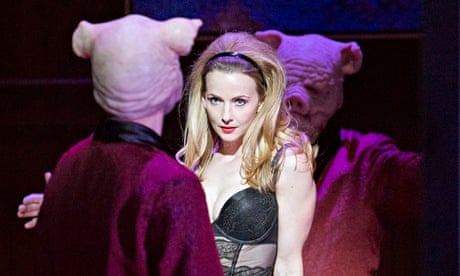Welsh National Opera's Fallen Women season is framed by two versions of the Manon Lescaut story. After Puccini's version now comes Hans Werner Henze's; first staged in 1952, Boulevard Solitude updates the story to Paris immediately after the second world war. It was Henze's first full-scale opera, and with a score that is a rich and strikingly beautiful mix of all that was musically fashionable in its time, it has remained one of his most often performed stage works; the last British production was Nikolaus Lehnhoff's superb Covent Garden one in 2001.
The Cardiff staging is the work of the same director and designer, Mariusz Treliński and Boris Kudlička, who were responsible for Manon Lescaut. It uses more or less the same underground-station set, complete with cocktail-lounge bar and ever present barman, and thronged with besuited commuters in the opening and closing scenes, and involves some of the same extraneous ideas, as well as introducing a few of its own. The curtain rises on a crime scene, with police in slow motion investigating the murder that Manon has committed, and just in case we missed its significance, the action returns to it in the first couple of orchestral interludes, too.
Like the doubles for Manon in stockings and suspenders, and the men in pigs' heads who are presumably her clients, it's a device that clutters the action rather than making clear anything that isn't perfectly obvious. In an opera in which the narrative thread is often quite fragile – Henze labelled the work "a lyric drama in seven tableaux" – Treliński consistently fails to define things as clearly as he might, so his treatment becomes an unconvincing gloss on a work that is already a gloss on a familiar story.
Musically, though, it's often very good indeed. Sarah Tynan's sinuous, leggy Manon, Jason Bridges' genuinely sympathetic Des Grieux and Benjamin Bevan's slightly two-dimensional Lescaut, as well as Adrian Thompson as the elder Lilaque, are all first rate, though dramatically there's not enough in the production to make them much more than ciphers.
Conductor Lothar Koenigs revels in music in which 12-note passages and neoclassicism sit comfortably together, and which brings in references to big-band jazz, blues and Paris music-hall, too. He judges it all perfectly; a passage of velvety string chords that cushions one of Manon's arias is a thing of heart-stopping beauty, and a rare moment when real emotion breaks through the brittle gloss.

Comments (…)
Sign in or create your Guardian account to join the discussion